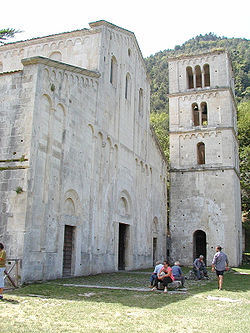Eleutherius and Antia
Martyr's palm |
|---|
Eleutherius, also written as Eleutherus, Eleuterus and Eleftherios; sometimes called Liberalis or Liberator,
History
Born in
The tradition states that Eleutherius was appointed bishop of Messana and Illyricum at the age of twenty and apparently settled in Aulon. He was imprisoned by a comes named Felix; Eleutherius and Antia were taken to Rome to be judged by the Emperor Hadrian. According to this source, Eleutherius and Antia were both condemned to death on December 15.[4] According to tradition, Eleutherius was clubbed to death, while Antia was beheaded.[6]
A Latin translation of this Greek text, dating from around the 8th century, states that Anicetus, after consecrating Eleutherius, assigned him to the see of Apuliam Aecanam civitatem (Aeca). Eleutherius and Antia were then taken to Rome and killed on April 18. The source states that the citizens of Aeca retrieved the bodies of the two martyrs from Rome and returned to their city with them.[4]
Messina still claims Eleutherius and Antia as natives, stating that he was born in this Sicilian city on April 18, 121, and that later Eleutherius became a bishop of Illyricum.[7] They were tortured with hot boiling oil, resin, and heated irons, and then thrown to the lions; none had the desired effect and finally the two were executed.
Their bodies were then, according to tradition, buried in the Roman church of
Veneration

Despite this confusion, Eleutherius' cult is ancient and widespread, and his name appears not only in ancient Greek calendars, but also in the
Rieti
The church of Sant'Eleuterio was built outside of the city walls of Rieti around the 5th century. According to tradition, the church claimed the relics of Eleutherius and Antia, carried from Rome by Bishop Primus of Rieti.[8] Around the 5th or 6th centuries, the Benedictine Stephen of Rieti founded a monastic community near the tomb of the two martyrs.[10]
Devotion to Eleutherius increased after a legend associated with the bishop Probus of Rieti: that before his death a vision appeared of the two saints, Eleutherius and Juvenal (Giovenale), to accompany the bishop into heaven.[10]
The church of Sant'Eleuterio acquired importance during the age of the
Other places in Italy
Numerous churches rose in Italy in honor of this saint. There was a church dedicated to him at Rome, on the
The monastery of San Liberatore a Maiella is dedicated to him.[4]
References
- ^ a b Borrelli, Antonio (September 14, 2002). "San Liberatore Vescovo e martire". Santie Beati. Retrieved August 7, 2008.
- ^ Elsie, Robert (2000). "The Christian Saints of Albania". University of Mississippi.
- ^ "St. Thomas Orthodox Church". Archived from the original on 2011-07-28. Retrieved 2010-09-03.
- ^ a b c d e f g "Santi Eleuterio ed Anzia Martiri". Santie Beati. October 12, 2002. Retrieved August 6, 2008.
- ^ Knight, Kevin (2008). "Pope St. Eleutherius (Eleutheros)". Catholic Encyclopedia New Advent. Retrieved August 7, 2008.
- ^ "Eleutherius and Antia". Catholic Online. 2010. Retrieved January 22, 2010.
- ^ a b "Dicearco da Messina". Granmirci. Retrieved August 7, 2008.
- ^ a b c "Santi Eleuterio e Anzia". Enrosadira. Retrieved August 6, 2008.
- ^ "And very soon Rieti had its first martyrs, the priest Marone and Vittorio di Cotilia: later on Eleuterio and his mother Anzia". See www.dopropertysearch.co.uk Archived 2008-06-08 at the Wayback Machine
- ^ a b Tozzi, Ileana. "La memoria dei Santi martiri Eleuterio ed Anzia presso la cattedrale di Rieti" (PDF). Outdoor Rieti. Archived from the original (PDF) on July 22, 2011. Retrieved August 6, 2008.
External links
- Eleuterius and Anthia
- (in Norwegian) De hellige Eleuterius av Illyria og Anthia og deres 11 ledsagere
- (in Italian) ELEUTERIO e ANZIA
- (in Italian) San Liberatore
- (in Italian) SANTI ELEUTERIO E ANZIA
- (in Italian) LA MEMORIA DI ELEUTERIO E ANZIA
- (in Italian) Dicearco da Messina
